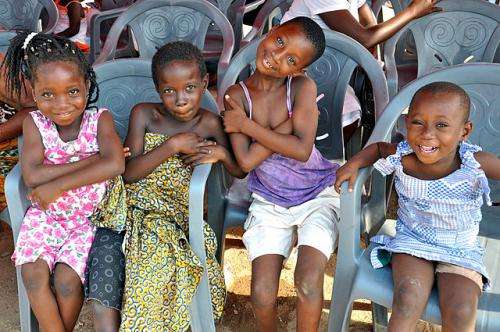Birth control good for education, women's work and growth in Africa

Short birth spacing reduces the chances of African children to go to school. Mothers of shortly spaced children have less opportunity to work and their households generate less wealth. However, the good news is: access to contraceptives and information campaigns reduce these problems as they enable women to plan their births better. This is the outcome of the doctoral research of Abiba Longwe, who defends her PhD thesis on 23 October at Radboud University Nijmegen.
Which mothers work less?
Longwe discovered that African women who have more children and shorter birth intervals due to unmet need for family planning are less involved in paid work. She also found the labour market opportunities of educated and urban women to be affected most. According to Longwe, the kind of jobs more highly educated women hold may play a role; unskilled work more often can be carried out close to the home or with a child on one's back. And urban women less often live in an extended family, where grandparents or other family members can look after the children.
Birth intervals and children's schooling
Short birth intervals also affect young children's schooling. Longwe's research shows that children born shortly after each other are less likely to go to primary school. This result is new; the consequences of short birth intervals for educational participation and other socio-economic outcomes in Africa have not yet been studied much. Longwe: 'Whereas negative effects on the health of mothers and children have been well documented, this type of long-term effects have received much less attention.'
Campaigns on family planning have effect...
She does, however, see reasons for hope, as her research also shows that information campaigns on family planning have effect. 'We see that such campaigns may lead to increasing acceptance and use of contraceptives, and through this to a reduction in the numbers of births, which in turn is associated with an increase in children's educational participation and rising household wealth.'
...also in the long run
Interestingly, Longwe also discovered that the increases in knowledge, acceptance and use of contraceptives are greater in regions with a higher educational level. This catalyst role of education indicates that by informing women about contraceptives and making them easily available, a positive feedback loop can be started in which better family planning increases the possibilities of children to go to school, as a result of which the future educational level of the region rises, which helps new generations to even better plan their pregnancies. The fact that women who have access to contraceptives have also more possibilities to work may give an extra boost to the development of poor African regions.
More information:
Longwe-Ngwira, A. "Family planning, fertility reduction and economic development in Africa"
Thesis defence on 23 October 2013 at Radboud University Nijmegen
Supervisors: Jeroen Smits and Eelke de Jong
Provided by Radboud University Nijmegen















